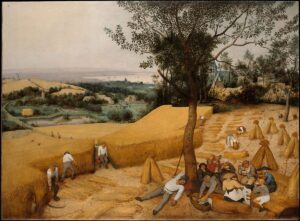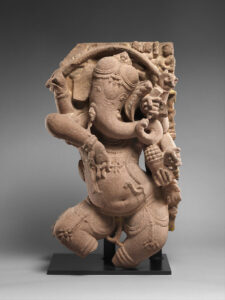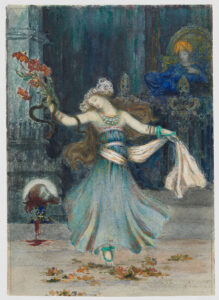August
There came three men from out of the West,
Their fortune for to try
As they had sworn a solemn oath,
John Barleycorn should die
They ploughed, they sowed, they harrowed him in,
Throwed clods upon his head.
And these three men made a solemn vow,
John Barleycorn was dead.
Then they let him lie for a very long time
Till the rain from heaven did fall. Then little John sprung up his head,
And soon amazed them all.
They let him stand till midsummer
Till he looked both pale and wan,
And little Sir John he growed a long beard
And so became a man.
They hired men with scythes so sharp
To cut him off at the knee
They rolled him and tied him by the waist,
and served him barbarously…

This year’s full moon is on August 9th and is called the Corn Moon.
August begins with a festival called Lammas or Lughnasah to celebrate the Celtic sun god, Lugh. His spirit inhabits the growing grain. Once the grain is harvested, it gives life to humankind and their animals. The festival celebrates once more the pattern of death and resurrection.
Lammas is a cross-quarter day, falling halfway between the summer solstice and the fall equinox. It is the first of the harvest festivals. In Great Britain, the first grains of the season were baked in a loaf and brought to church for a special blessing, called “loaf mass.” Every member of the household was to take a bite of the blessed bread for good luck, health and prosperity in the coming year.

The Hindus celebrate the god Ganesha during the month of August. He was said to have been created by the goddess, Parvati. With his beautiful face and several arms, he looked like every other Hindu god. Unfortunately, he crossed the great god, Shiva, who decapitated him. Parvati was so furious with Shiva, she barred him from her bed chamber. He relented and promised her that he would restore Ganesha’s head with the head of the next animal who happened by. And that’s how Ganesha became the elephant-headed god. He’s the god of new beginnings, of arts and letters, and of good fortune. Make an altar for him and offer him a bowl of sweets or red flowers. His prayer is: Om Shri Ganeshaya Namah.
St. Bartholomew’s feast day falls on August 24th. He died by being skinned alive. He’s the patron saint of butchers, leatherworkers and bookbinders.
If Bartlemas Day be fine and clear
You may hope for a prosperous Autumn that year.
All the tears St Swithin can cry
St. Barthelmy’s mantle can wipe dry.
—If that makes no sense to you, see my almanac for July.

John the Baptist was beheaded at the request of King Herod’s niece, Salome, after she danced for him at his birthday feast. This leads us to Philip Stubbes, a culture critic of 16th century England in his The Anatomy of Abuses, 1573:
All mixed, effeminate, lascivious, amorous dancing is utterly unlawful to Christians, to chaste and sober persons. For if Herod with but seeing Salome dance was so inflamed by her love, that he promised to give her whatsoever she desired…what would he have promised, had he danced with her? And I have heard many impudently say, that they have chosen their Wives, and Wives their Husbands, by dancing. Which plainly proves the Wickedness of it.
With that admonishment we turn to writing—
Born August 1, 1819, Herman Melville, wrote: I know not all that may be coming, but be it what it will, I’ll go to it laughing.—from his famous Moby Dick.
The renowned writer and civil rights activist James Baldwin was born on August 2nd 1924. He wrote: The most dangerous creation of any society is the man who has nothing to lose. He shares his birthday with novelist Isabel Allendale. She’s written many charming books, but her best and most memorable is House of Spirits.
Guy de Maupassant, considered the 19th century master of the short story, was born on August 5th, 1850—Words dazzle and deceive because they are mimed by the face. But black words on a white page are the soul laid bare.
Winner of the Golden Booker for In a Free State, V.S. Naipaul was born on August 17th, 1932.
Celebrated wit Ogden Nash was born on August 19th, 1902. He wrote: You are only young once, but you can stay immature indefinitely.
H.P. Lovecraft was born on August 20th, 1890. His philosophy that humans are particularly insignificant in the larger intergalactic existence… informed his speculative fiction.
Beloved storyteller, Ray Bradbury was born on August 22nd, 1920. Best known for Martian Chronicles, Fahrenheit 451, and The Illustrated Man, once said: If you enjoy living, it is not difficult to keep the sense of wonder.
Theodore Dreiser, born on August 27th, 1871 once wrote: The most futile thing in this world is any attempt, perhaps, at exact definition of character. All individuals are a bundle of contradictions – none more so than the most capable. He’s best known for Sister Carrie.
Johann Wolfgang von Goethe, scientist, playwright, novelist, poet and philosopher, was born on August 28th, 1749. He wrote Faust, Part One and Two.
One of the greatest and most influential writer of all time, Leo Tolstoy, was also born on August 28, seventy-nine years after Goethe. His most famous novels are War and Peace and Anna Karenina, but he wrote many other novels and novellas and 56 short stories.
Mary Wollstonecraft Shelley was born on August 30th, 1797. Her mother was a philosopher and well-known advocate for women’s rights. Mary is most known for her iconic novel, Frankenstein, and her marriage to poet, Percy Bysshe Shelley.
Kurt Vonnegut said this of the writer William Saroyan: …the first and still the greatest of all American minimalists. Saroyan was born on August 31st, 1908.

